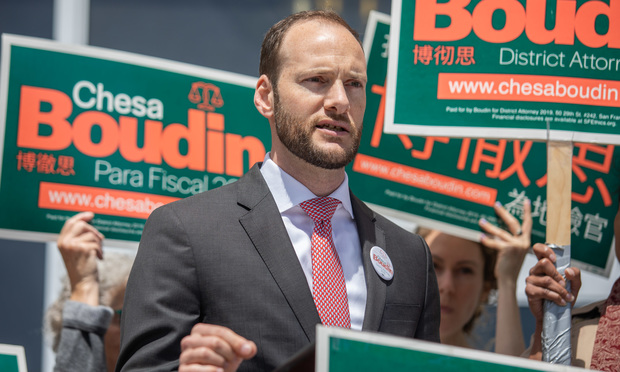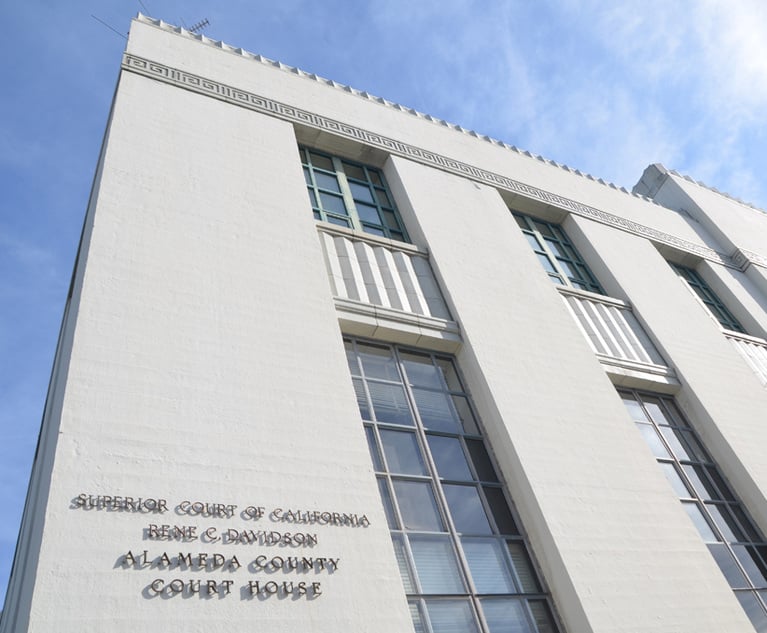Citing George Floyd's Death, Prosecutors Ask State Bar to Block Police Endorsements
A spokeswoman for the California state bar said "it would be premature" for leaders of the agency to comment on a proposal for new ethics rules.
June 01, 2020 at 06:32 PM
3 minute read
 SF District Attorney Chesa Boudin last year at a press conference during his campaign. Photo: Jason Doiy/ALM
SF District Attorney Chesa Boudin last year at a press conference during his campaign. Photo: Jason Doiy/ALM
Three Northern California district attorneys called on the state bar Monday to adopt new ethics rules barring elected prosecutors and district attorney candidates from accepting political contributions from law enforcement unions.
After days of protests over the death of George Floyd in police custody in Minneapolis, the DAs from San Francisco, Contra Costa and San Joaquin counties said in a video conference that professional rules should eliminate any appearance of conflict when prosecutors review allegations against police officers.
The three prosecutors—Chesa Boudin, Diana Becton and Tori Verber Salazar—were joined by former San Francisco District Attorney George Gascón, who is running for the top prosecutorial job in Los Angeles. Gascón said that while he accepted police union contributions in his 2011 campaign he will "never do so again."
"The influence or appearance of influence erodes" public trust in prosecutorial review of police misconduct, he said Monday.
A spokeswoman for the state bar said, "it would be premature" for leaders of the legal regulatory agency to comment. Messages left for representatives of the California District Attorneys Association, including its president, Alameda County District Attorney Nancy O'Malley, were not returned.
The Rules of Professional Conduct, the California Penal Code and associated case law offer guidelines for when attorneys, and specifically prosecutors, should or must recuse themselves or when they must advise their clients of a conflict.
"These rules, however, do not preclude the attorney or prosecutor from soliciting or receiving financial support from an individual or organization that is financing opposing counsel," the four DAs who appeared Monday wrote in a letter to state bar leaders. "It is illogical that the rules prohibit prosecutors from soliciting and benefiting from financial and political support from an accused officer's advocate in court, while enabling the prosecutor to benefit financially and politically from the accused's advocate in public."
Contra Costa County District Attorney Diana Becton called the nuanced language "a loophole" that "needs to change and … needs to change now."
The four prosecutors asked the bar for an expedited review of their request, although the rule-adoption process can typically be a lengthy one.
Richard Zitrin, a San Francisco lawyer and legal ethics specialist, said such a rule change would likely survive a free-speech challenge.
"There's no question that lawyers' free speech can be and is regulated by the state bar," Zitrin said. "This is in keeping with the state bar moving in the direction of significant prosecutorial enlightenment."
Read more:
California Courts Close Amid Violence and Vandalism
General Counsel, Corporations React Publicly to George Floyd's Death
This content has been archived. It is available through our partners, LexisNexis® and Bloomberg Law.
To view this content, please continue to their sites.
Not a Lexis Subscriber?
Subscribe Now
Not a Bloomberg Law Subscriber?
Subscribe Now
NOT FOR REPRINT
© 2025 ALM Global, LLC, All Rights Reserved. Request academic re-use from www.copyright.com. All other uses, submit a request to [email protected]. For more information visit Asset & Logo Licensing.
You Might Like
View All

Fresh lawsuit hits Oregon city at the heart of Supreme Court ruling on homeless encampments
4 minute read

Trending Stories
- 1Uber Files RICO Suit Against Plaintiff-Side Firms Alleging Fraudulent Injury Claims
- 2The Law Firm Disrupted: Scrutinizing the Elephant More Than the Mouse
- 3Inherent Diminished Value Damages Unavailable to 3rd-Party Claimants, Court Says
- 4Pa. Defense Firm Sued by Client Over Ex-Eagles Player's $43.5M Med Mal Win
- 5Losses Mount at Morris Manning, but Departing Ex-Chair Stays Bullish About His Old Firm's Future
Who Got The Work
J. Brugh Lower of Gibbons has entered an appearance for industrial equipment supplier Devco Corporation in a pending trademark infringement lawsuit. The suit, accusing the defendant of selling knock-off Graco products, was filed Dec. 18 in New Jersey District Court by Rivkin Radler on behalf of Graco Inc. and Graco Minnesota. The case, assigned to U.S. District Judge Zahid N. Quraishi, is 3:24-cv-11294, Graco Inc. et al v. Devco Corporation.
Who Got The Work
Rebecca Maller-Stein and Kent A. Yalowitz of Arnold & Porter Kaye Scholer have entered their appearances for Hanaco Venture Capital and its executives, Lior Prosor and David Frankel, in a pending securities lawsuit. The action, filed on Dec. 24 in New York Southern District Court by Zell, Aron & Co. on behalf of Goldeneye Advisors, accuses the defendants of negligently and fraudulently managing the plaintiff's $1 million investment. The case, assigned to U.S. District Judge Vernon S. Broderick, is 1:24-cv-09918, Goldeneye Advisors, LLC v. Hanaco Venture Capital, Ltd. et al.
Who Got The Work
Attorneys from A&O Shearman has stepped in as defense counsel for Toronto-Dominion Bank and other defendants in a pending securities class action. The suit, filed Dec. 11 in New York Southern District Court by Bleichmar Fonti & Auld, accuses the defendants of concealing the bank's 'pervasive' deficiencies in regards to its compliance with the Bank Secrecy Act and the quality of its anti-money laundering controls. The case, assigned to U.S. District Judge Arun Subramanian, is 1:24-cv-09445, Gonzalez v. The Toronto-Dominion Bank et al.
Who Got The Work
Crown Castle International, a Pennsylvania company providing shared communications infrastructure, has turned to Luke D. Wolf of Gordon Rees Scully Mansukhani to fend off a pending breach-of-contract lawsuit. The court action, filed Nov. 25 in Michigan Eastern District Court by Hooper Hathaway PC on behalf of The Town Residences LLC, accuses Crown Castle of failing to transfer approximately $30,000 in utility payments from T-Mobile in breach of a roof-top lease and assignment agreement. The case, assigned to U.S. District Judge Susan K. Declercq, is 2:24-cv-13131, The Town Residences LLC v. T-Mobile US, Inc. et al.
Who Got The Work
Wilfred P. Coronato and Daniel M. Schwartz of McCarter & English have stepped in as defense counsel to Electrolux Home Products Inc. in a pending product liability lawsuit. The court action, filed Nov. 26 in New York Eastern District Court by Poulos Lopiccolo PC and Nagel Rice LLP on behalf of David Stern, alleges that the defendant's refrigerators’ drawers and shelving repeatedly break and fall apart within months after purchase. The case, assigned to U.S. District Judge Joan M. Azrack, is 2:24-cv-08204, Stern v. Electrolux Home Products, Inc.
Featured Firms
Law Offices of Gary Martin Hays & Associates, P.C.
(470) 294-1674
Law Offices of Mark E. Salomone
(857) 444-6468
Smith & Hassler
(713) 739-1250






